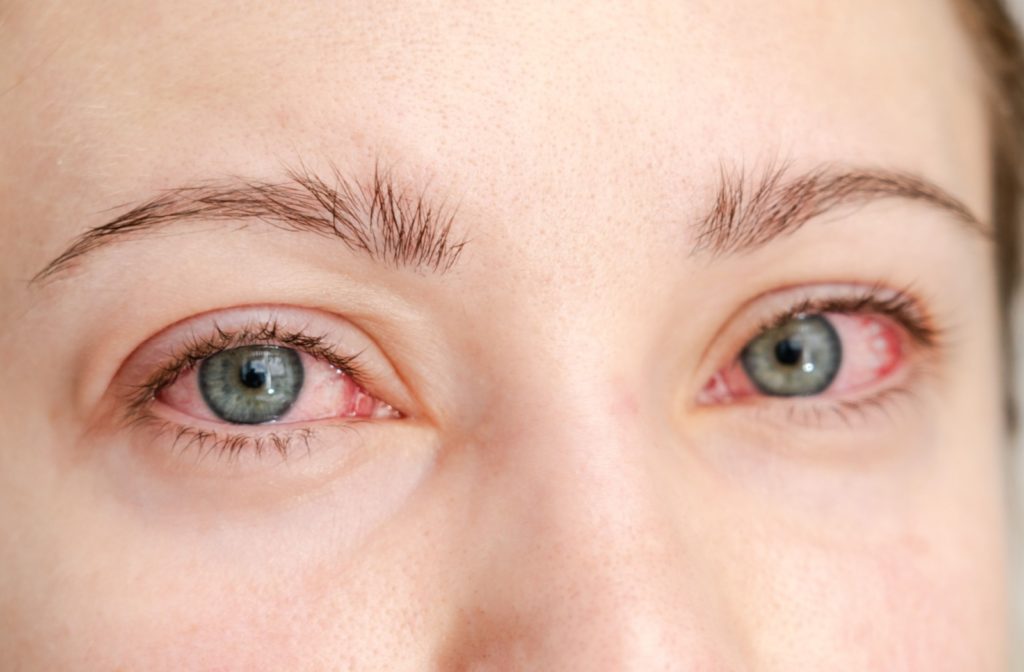You may have noticed tiny specks or cobweb-like shapes drifting across your vision. These are known as eye floaters, and while common, they can be quite distracting. At the same time, many people deal with allergies, which often cause itchy, watery eyes. But can allergies cause eye floaters?
While there is no direct link to allergies causing eye floaters, you may get eye floaters from vigorous eye rubbing or inflammation related to allergies. To maintain overall eye health, visit your eye doctor for regular eye exams or if you experience vision changes.
What Are Eye Allergies?
Eye allergies, or allergic conjunctivitis, is a common condition where the eyes become irritated, itchy, and watery due to an allergic reaction. It mainly affects the conjunctiva or the tissue inside of the eyelid. Eye allergies typically occur when the eyes come into contact with the following:
- Outdoor allergens: Dust or pollen from grass and trees
- Indoor allergens: Mold, pet dander, and dust mites
- Irritants: Pollution, cigarette smoke, and perfume
Symptoms of eye allergies can include:
- Itchy eyes
- Redness
- Tearing
- Swollen eyelids
Allergies can also indirectly impact eye health by causing inflammation and irritation. It’s important to consult your eye doctor to diagnose and treat allergies and related eye concerns properly.
Different types of eye allergies include:
- Seasonal allergic conjunctivitis
- Perennial allergic conjunctivitis
- Vernal keratoconjunctivitis
- Atopic keratoconjunctivitis
- Contact allergic conjunctivitis
- Giant papillary conjunctivitis
Allergy Prevention & Treatment
Non-prescription and prescription treatment for allergies can include:
- Artificial tears can wash away allergens and reduce irritation and other symptoms.
- Oral antihistamines can help manage systemic allergy symptoms such as itchy eyes.
- Over-the-counter decongestant eyedrops can reduce redness, and those with an antihistamine can alleviate itching.
- Allergy shots or immunotherapy contain tiny amounts of allergen that can help reduce your sensitivity to allergens over time.
You can also take the following measures to prevent allergy symptoms:
- Identify and avoid allergy triggers like pollen, pets, or dust.
- Keeping the air in your home clean with air purifiers can reduce exposure to allergens.
- Keep windows closed when pollen counts are high.
- Wear protective eyewear when outdoors, such as eyeglasses or sunglasses.
- Wash your hands after touching animals or before you touch your eyes.
- Avoid eye rubbing as it can worsen symptoms.
What Are Eye Floaters?
Eye floaters are small, dark shapes that appear to float in your field of vision and move when you directly look at them. The cause of eye floaters is tiny fibers clumping together in the eye’s vitreous gel that cast shadows on the retina (the light-sensitive tissue at the back of the eye). Other causes of eye floaters can include:
- Inflammation
- Infection
- Eye injury
- Retinal tear or trauma in the retina
- Diabetic retinopathy
- Eye tumors
Eye floaters are described as black or gray dots, specks, or shapes that might look like the following:
- Lines
- Rings
- Cobwebs
- Other irregular shapes
Floaters can be a normal part of aging, and everyone can get them. However, a sudden increase in floaters can indicate another eye issue. Visit your eye doctor if you experience persistent or worsening eye floaters.
Eye Floaters Prevention & Treatment
In many instances, floaters are more of a nuisance and rarely threaten vision. However, your eye doctor may recommend treatment for persistent floaters or if the number of floaters increases and they affect vision. Treatment for floaters includes:
- Laser therapy to break up or dissolve large floaters.
- Surgery to remove the vitreous gel that causes floaters and replace it with a saline solution.
While you can’t prevent floaters, you can do some things to maintain eye health, such as:
- Wear protective eyewear outdoors
- Wear protective eyewear to prevent eye injuries
- Eat a healthy diet
- Quit smoking
- Rest your eyes frequently

Can Allergies Cause Eye Floaters?
Eye floaters and allergies affect different parts of the eye. While there is no direct pathway for allergies to cause eye floaters, allergies can lead to inflammation and itching that might affect other eye areas.
Allergies and eye rubbing can lead to inflammation. Chronic inflammation from allergies may indirectly influence the vitreous, causing changes that might contribute to the appearance of floaters.
Outlook for Managing Allergies & Eye Health
Understanding allergies and eye floaters is essential for maintaining eye health. While there’s no direct link, managing allergy symptoms, especially inflammation, and avoiding behaviors like excessive eye rubbing can prevent complications. Regular eye exams and consultations with your eye doctor remain pivotal in keeping your vision clear and healthy.
Don’t wait for eye symptoms to worsen. Taking proactive steps now can help create a brighter and clearer future for your eye health.If you experience allergies, sudden vision changes, or floaters, book an appointment with Total Vision Rancho Bernardo for a personalized eye exam, diagnosis, and treatments tailored to your needs.



